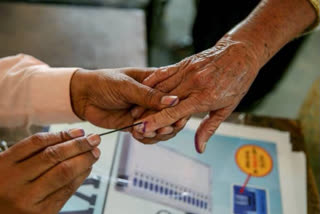Srinagar:Exercising the right to franchise in a place like Kashmir has been a challenge, throughout, because of the civil unrest. Elections in Kashmir have been a taboo. But, DDC (District Development Council) polls seem to have earned acceptability for the electoral politics in the society.
Apart from the disruption of a routine, the legitimacy of electoral politics has been the first casualty of the Kashmir conflict since 1987. The elected representatives used to be targeted by various militant groups and labelled as part of what they call the larger "Indian narrative - Kashmir an integral part of India."
Jammu and Kashmir has witnessed the killing of about 5,000 political workers mostly from the various mainstream parties seeking to find a solution through ballot by simultaneously demonizing the violence.
However, the ongoing District Development Elections (DDC) in the Union Territory of Jammu and Kashmir seem to have changed the entire political narrative, thus making the poll process a legitimate way of seeking a political solution to a problem which has witnessed decades of bloodshed.
Also read:BJP releases manifesto in Urdu for Kashmir DDC polls
This transition from boycott to acceptance of the polls has its roots in the decision which was taken by the present dispensation on 5th August 2019 when the erstwhile state of Jammu and Kashmir was stripped of its special status and downgraded into two Union Territories - Jammu and Kashmir and Ladakh, one with the legislative assembly and another without it.
The political parties which used to participate in elections were left high as their parties' agenda had their genesis in the scrapped special status. Before they would make some noise, the Central government put them either behind the bars or kept them at their residences that were turned into sub jails under the Public Safety Act for months. Among them were three former chief ministers, state cabinet ministers and former members of parliament.
After their release, the government led by the BJP started to have its vote base in Kashmir presuming the regional parties will join hands with separatists in their election boycott strategy. But the parties instead joined hands against the BJP and opened a common front against the ruling party. This seemed to have unnerved the BJP. The government is alleged to have restricted the movement of candidates fielded against the BJP in the ongoing DDC elections. Before the allegedly parochial politics of the ruling party would go viral with some embarrassing moves, the state electoral officer attributed the restriction to security concerns.
The overwhelming and fearless participation of voters during the first phase of DDC election in Kashmir is what analysts believe a major paradigm shift and a new agreed reality that participating in the election is no more a taboo. The freely chosen behaviour has given the Gupkar Alliance members a breather and acceptance in the society.
Also read:J&K goes to polls, Congress says it's time to re-establish democracy
The television screens dotted with voters from both the genders of all age groups facing the lenses without any hesitation. The election boycott call by separatist groups and subsequent endorsement or support by various militant groups would otherwise delegitimize the whole democratic process in the region as has been seen in the past.
The same process is seen as a means of finding a solution to a problem that emerged after the reading down of Article 370. The contesting parties have their agendas that surround the 5th August decision. The BJP and its team B, the Apni Party led by Altaf Bukhari are trying to ensure that the scrapping of Article 370 makes its purpose felt while the Gupkar Alliance aims to restore the special status. Now the audience will have to wait till the election results are out to see if the BJP's purpose has been served or they will have to work out another strategy to win over the people.
